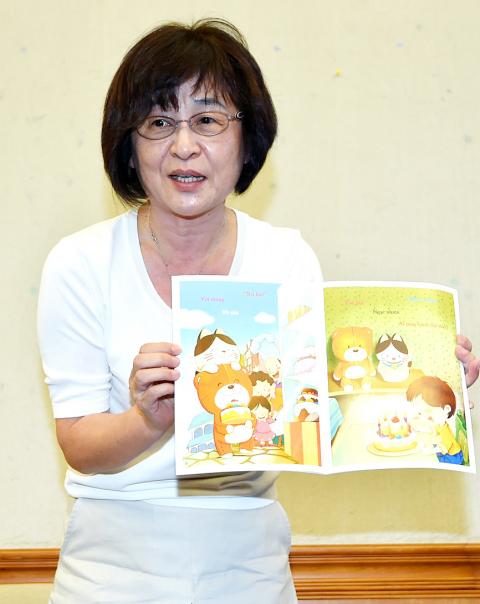Democratic Progressive Party Legislator Su Chih-feng (蘇治芬) yesterday said that the Vietnamese government did not give any explanation for a series of difficulties she encountered on a trip this week.
Su and her entourage returned from Vietnam yesterday after a five-day trip to learn more about a pollution incident involving a Formosa Plastics Group steel mill in Ha Tinh Province, visit a Catholic orphanage in Vinh and purchase Vietnamese children’s books to promote mother-tongue education in Yunlin County.
Su said her passport was temporarily held at Noi Bai International Airport in Hanoi, the group was prohibited from visiting the orphanage and they were followed on a trip to the steel mill.

Photo: Liao Chen-huei, Taipei Times
“The Vietnamese government did not make any direct or indirect contact with us,” she said. “I still do not understand why my passport was held by airline clerks.”
Su’s passport was held for unknown reasons when the group was to fly to Vinh.
After Representative to Vietnam Richard Shih (石瑞琦) negotiated with Vietnamese officials, the group was told that they were not allowed to visit the orphanage, so they canceled that event and went to Ha Tinh by bus, Su said.
While media reports said that Su was blocked because the church is an “anti-[Vietnamese] government” organization, Su said she was totally unaware of the church’s political nature and they simply wanted to visit the orphanage for charity purposes.
“I do not know any so-called anti-government people or dissidents,” she said.
“I still do not know whether the church leadership are anti-government,” she added.
Brushing aside speculation that her passport was held because the group planned to visit places not listed on her visa application, Su said they went to Vietnam on tourist visas and they were never asked to provide an itinerary, so there was no conflict between the planned trip and where they actually went.
They were never asked to explain the purpose of their travel, but they were not given any explanation for the situation, Su said, adding that the group never met any Vietnamese officials, while negotiations were conducted by Shih.
In Ha Tinh, the group was followed by plainclothes police officers and they had to ask permission to visit places, Su said. The police arranged a visit to a head massage parlor and watched during the time there.
“It is impossible to feel comfortable while being followed,” she said.
Su quoted chemist Ding Guo-tsuen (丁國村), who was with the group, as saying that the Formosa Ha Tinh Steel Corp plant is a world-class facility, but that could not prevent human error.
She said that even after the visit, the group did not understand anything about the pollution incident other than what was reported by the media, but she questioned the transparency of the Vietnamese government’s investigation.
Hanoi said the plant was responsible for causing a mass fish die-off in the province and downstream areas in April.
“We cannot reach a definite conclusion on the pollution incident,” Su said. “The Vietnamese government is obliged to make its investigation report public.”
Su reaffirmed her endorsement of the government’s “new southbound policy” amid concerns that the issues she faced on the trip might spell its failure.
The presence of Taiwanese companies is strong in Vietnam and Vietnamese are energetic and friendly toward Taiwanese, she said.

Alain Robert, known as the "French Spider-Man," praised Alex Honnold as exceptionally well-prepared after the US climber completed a free solo ascent of Taipei 101 yesterday. Robert said Honnold's ascent of the 508m-tall skyscraper in just more than one-and-a-half hours without using safety ropes or equipment was a remarkable achievement. "This is my life," he said in an interview conducted in French, adding that he liked the feeling of being "on the edge of danger." The 63-year-old Frenchman climbed Taipei 101 using ropes in December 2004, taking about four hours to reach the top. On a one-to-10 scale of difficulty, Robert said Taipei 101

Nipah virus infection is to be officially listed as a category 5 notifiable infectious disease in Taiwan in March, while clinical treatment guidelines are being formulated, the Centers for Disease Control (CDC) said yesterday. With Nipah infections being reported in other countries and considering its relatively high fatality rate, the centers on Jan. 16 announced that it would be listed as a notifiable infectious disease to bolster the nation’s systematic early warning system and increase public awareness, the CDC said. Bangladesh reported four fatal cases last year in separate districts, with three linked to raw date palm sap consumption, CDC Epidemic Intelligence

Taiwanese and US defense groups are collaborating to introduce deployable, semi-autonomous manufacturing systems for drones and components in a boost to the nation’s supply chain resilience. Taiwan’s G-Tech Optroelectronics Corp subsidiary GTOC and the US’ Aerkomm Inc on Friday announced an agreement with fellow US-based Firestorm Lab to adopt the latter’s xCell, a technology featuring 3D printers fitted in 6.1m container units. The systems enable aerial platforms and parts to be produced in high volumes from dispersed nodes capable of rapid redeployment, to minimize the risk of enemy strikes and to meet field requirements, they said. Firestorm chief technology officer Ian Muceus said

MORE FALL: An investigation into one of Xi’s key cronies, part of a broader ‘anti-corruption’ drive, indicates that he might have a deep distrust in the military, an expert said China’s latest military purge underscores systemic risks in its shift from collective leadership to sole rule under Chinese President Xi Jinping (習近平), and could disrupt its chain of command and military capabilities, a national security official said yesterday. If decisionmaking within the Chinese Communist Party has become “irrational” under one-man rule, the Taiwan Strait and the regional situation must be approached with extreme caution, given unforeseen risks, they added. The anonymous official made the remarks as China’s Central Military Commission Vice Chairman Zhang Youxia (張又俠) and Joint Staff Department Chief of Staff Liu Zhenli (劉振立) were reportedly being investigated for suspected “serious